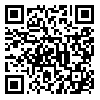Volume 23, Issue 2 (8-2024)
jhosp 2024, 23(2): 205-225 |
Back to browse issues page
Download citation:
BibTeX | RIS | EndNote | Medlars | ProCite | Reference Manager | RefWorks
Send citation to:



BibTeX | RIS | EndNote | Medlars | ProCite | Reference Manager | RefWorks
Send citation to:
Vali L, Farehmandnia H, Mohammadpour A. Explaining the Experiences of The Elderly from Pre-Hospital Emergency Services in Shiraz. jhosp 2024; 23 (2) :205-225
URL: http://jhosp.tums.ac.ir/article-1-6691-en.html
URL: http://jhosp.tums.ac.ir/article-1-6691-en.html
1- Associate Professor, Kerman University of Medical Sciences, Faculty of Management and Medical Information Sciences, Kerman, Iran.
2- Assistant Professor, Kerman University of Medical Sciences, Faculty of Management and Medical Information Sciences, Kerman, Iran.
3- Postgraduate student in healthcare management. *Corresponding Author Email: ahmadreza.mohammadpour75@gmail.com
2- Assistant Professor, Kerman University of Medical Sciences, Faculty of Management and Medical Information Sciences, Kerman, Iran.
3- Postgraduate student in healthcare management. *Corresponding Author Email: ahmadreza.mohammadpour75@gmail.com
Abstract: (50 Views)
Background and purpose:
As people age, physical dysfunction often increases, leading to various challenges and a heightened need for urgent medical services. Elderly individuals are among the primary users of healthcare and pre-hospital emergency services. Their subjective experiences during emergencies are influenced by their need for timely and relevant information regarding emergency procedures and their clinical condition—a need that is also shared by their caregivers. This study aims to elucidate the experiences of elderly individuals who have used pre-hospital emergency services in Shiraz.
Methods: This qualitative study was conducted in two phases. In Phase 1, semi-structured interviews were conducted with 21 elderly participants using purposeful and snowball sampling until data saturation was achieved. The interview transcripts were analyzed using Colaizzi’s method to extract key themes. In Phase 2, a panel of experts was convened to further discuss the findings and provide recommendations.
Results: Analysis of the interviews revealed several themes related to the elderly’s experiences with pre-hospital emergency services. These themes were categorized into sub-themes including ambulance condition, performance of technicians, timeliness of emergency response, and issues related to emergency rules and regulations. In Phase 2, the expert panel offered practical solutions to address the identified challenges.
Conclusion: The findings indicate that elderly patients face significant challenges when accessing pre-hospital emergency services, such as poor ambulance conditions, suboptimal technician performance, delayed emergency response times, and restrictive emergency protocols. The recommendations provided by the expert panel could inform policy development and lead to improvements in the quality of pre-hospital care for the elderly.
Methods: This qualitative study was conducted in two phases. In Phase 1, semi-structured interviews were conducted with 21 elderly participants using purposeful and snowball sampling until data saturation was achieved. The interview transcripts were analyzed using Colaizzi’s method to extract key themes. In Phase 2, a panel of experts was convened to further discuss the findings and provide recommendations.
Results: Analysis of the interviews revealed several themes related to the elderly’s experiences with pre-hospital emergency services. These themes were categorized into sub-themes including ambulance condition, performance of technicians, timeliness of emergency response, and issues related to emergency rules and regulations. In Phase 2, the expert panel offered practical solutions to address the identified challenges.
Conclusion: The findings indicate that elderly patients face significant challenges when accessing pre-hospital emergency services, such as poor ambulance conditions, suboptimal technician performance, delayed emergency response times, and restrictive emergency protocols. The recommendations provided by the expert panel could inform policy development and lead to improvements in the quality of pre-hospital care for the elderly.
Type of Study: Case Study |
Subject:
سایر
Received: 2024/08/18 | Accepted: 2025/02/10 | Published: 2025/03/12
Received: 2024/08/18 | Accepted: 2025/02/10 | Published: 2025/03/12
| Rights and permissions | |
 |
This work is licensed under a Creative Commons Attribution-NonCommercial 4.0 International License. |





